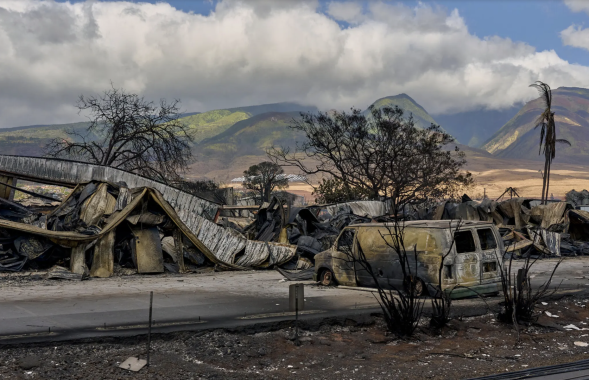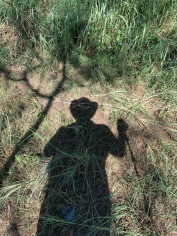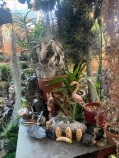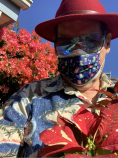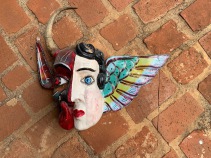Trauma
Alternate Titles
Trauma and Epistemology [Stupid title but the point being that most our knowledge of anatomy and physiology of the body comes to us on the wings of trauma; the object of study is the Traumatized Body.]
Trauma: Tired of hearing about it? Expect to see more of it [Also stupid but from a different direction. Way too flippant; too flippantly prophetic. A defense mechanism title; distances me from that Destroying Angel. And also a reminder to resist fetishizing trauma, avoid getting all serious about it and putting it on display. Don't let it get all up in your business.]
Chaos Invades the Body
Trauma is the imprint left in the body of a violent encounter. It may me of one impactful event or an accumulation of insults, like Chinese water torture. The fact that it is transmissible tells us much about the real nature of the body. Viral-like, the pattern of a trauma can seep from one person, sliding unseen past immune defenses, implanting a memory of another’s ‘event’ into your own body schema (the body’s own sense of itself).
Phase Seven engages the immune system of the shared body. When I acknowledge and refuse an invasive (violent) pattern (a pattern here is meant as a way of holding yourself, a posture) then that pattern is nullified. As this is done in the phase of the shared body it is generally nullified.
[I have been neglecting writing for a while. Many reasons why. Could say (to over simplify the overdetermined) I simply haven't felt like writing here. Now I'm beginning to feel like it again. Trauma keeps coming to mind and I keep avoiding it. There's an irony. What keeps trauma going but the avoiding of it?]
Taking on Trauma once again I reread what I wrote above. It is dreadful writing. Try some different tacks. Start with looking at the word, what it means, how it came to mean what it means. From Online Etymology Dictionary:
trauma (n.)
1690s, "physical wound," medical Latin, from Greek trauma "a wound, a hurt; a defeat," from PIE *trau-,
extended form of root *tere- (1) "to rub, turn," with derivatives referring to twisting, piercing, etc.
Sense of "psychic wound, unpleasant experience which causes abnormal stress" is from 1894.
1893, in reference to physical wounds; 1949 in the psychological sense, from Greek traumat-,
Something rubbed you the wrong way, in a big way. Pulled from the Greek (so as to make the speaker sound very smart and authoritative) the 'trauma' word has been used to mean wounds to the flesh of the Body. Thus major hospitals have Trauma Centers to ameliorate the carnage of the gun and the automobile and the now more than occasional 'natural' disaster.
But the meaning that has come to dominate in our everyday parlance is the latter one, referring to the wounded psyche. "Trauma Informed Care" is suffusing through all sorts of clinics and care programs. You can say "pee-tee-yes-dee" to just about anybody and not need to explain. Aggressively marketed trauma training programs abound.
Tools demand of us they be used. As we have tools (for sale) to treat trauma we must search it out wherever it is hiding. And possibly "manufacturing" a diagnosis (can't provide treatment without first a diagnosis).
The world is only as we act upon it. The world is as technology makes it. Do we follow the bidding of technology? Are we a 'tool' of technics?
It may be that this blossoming of trauma awareness and hypertrophy of workshops and trainings, which seems market-driven, is a response to the large-scale, ongoing, and accelerating planetary trauma. Hot in the middle of the sixth great extinction, an evolutionary bottleneck is clear on the horizon. This may be just-in-time emergency preparedness training.
Much of our knowledge of the body has come to us as a result of trauma. I have no doubt that our sacred texts of anatomy were born from observations made in the wake of deadly trauma.
AT Still, founder of osteopathy, as a 'surgeon' in the Civil War saw what happens when soma and psyche are torn asunder. At the same time, in New York, Walt Whitman, working as a nurse tending wounded Union soldiers, came to the same conclusion: body and soul are one. The movement toward a holistic way of studying the body grew out of a split in the body politic.
Chaos enters (penetrates) the Body. It can enter through various portals. As we study the tracks of trauma (chaos) as it suffuses through the Body we can begin to see the Body in its 'reality.' One of these portals is "the body as it is about to become; that of the body that precedes itself into being.
Trauma is the engagement of chaos and the Body. Chaos can enter the body, penetrate, and wound through many portals. I say there are seven out of respect for custom (the Greek nomos is custom and tradition as much as law). To more fully know the Bdoy, along with science (a science that understands its limitations) we need poetics. By poetics, I don't mean poetry (though certainly that, too) but a different way of mapping the Body, This map would indicate the emotional terrain; the ethical, aesthetic, and spiritual terrain of the Body. A more complete mapping of the experience of a corporeal human person.
Being in Hawai'i had been feeling like being in the eye of a hurricane; preternaturally calm as chaos vamps about the globe. Any sense of safety is always contingent, unable to cleanse it of a certain uncertainty;" certain there will be a what and a when, uncertain of just what, just when.
In 1992 there was Hurricane Iniki that devastated the island of Kauai. Hurricanes are expected here though certain conditions of geography and climate make them relatively rare, they are to be expected and we are all constantly prompted to be prepared for that eventuality. But what struck was a sudden, unexpected, ravishing fire, for which we were not prepared. And now I watch, knowing the fire is a 'safe' distance away (an ocean away, in a way). I learned a lot about trauma from Inikii. [see my "Who Am I" page for more about this, as well as some of my writings about "The Chapman's Reflex Network"] For those of us who were not immediately present at the fire, it will take time for the shock waves to reach into the flesh.
In times of great turbulence, any illusory division of care into for-self and for-other vanishes.
Chaos Invades the Body
Physiologically speaking, the body needs to maintain a slight connection to Chaos. If things get too orderly in there it signals impending doom. It provides a sort of elasticity and is a more accurate 'inside' modeling of the world 'outside.' There is a Goldilocks range of Chaos. Stress could be a synonym for chaos. There is good stress and bad stress; eustress and distress. Too much of either can discombobulate the Body in all sorts of strange and pernicious ways.
The Body has its fleshy manifestation. This way in which we have for centuries agreed to model the Body has come to feel like the real and true way the body is. The word body means entirely the flesh of the Body. [by 'flesh' I mean meat, bones, fluids, soft tissues, all that sort of stuff.] This is the flesh portal; we might think of taking a direct blow to the body. We see this body as indispensable. It can metabolize only so much trauma/chaos.
Wildfires on Maui are close to home; we are heartsick. What are those feelings of my body I refer to with that one word: heatesick. Is my own self-survival under immediate threat? No. But I do look at the dry grassy, brushy edges of the foot of the forest just outside where we perch in a fringe of Honolulu. Combustible.
